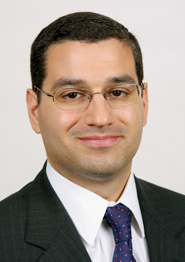Floor trading might be in decline, but it’s far from dead. In fact designated market makers on the floor of the New York Stock Exchange have been making headlines recently.
NYSE just spent several million dollars on new posts for DMMs on the floor. Market maker Getco paid an undisclosed amount to acquire the DMM business of Bank of America Merrill Lynch. And now Virtu Financial has acquired a market-making unit from Cohen Capital and is poised for a possible entry into the DMM business on the New York.
Floor traders have been hearing about their eminent demise for years now, but the DMM business, which sits at the heart of NYSE floor trading, is beating strong. That’s apparent by the brand new posts being unveiled by the New York after the exchange made a “significant” capital investment, according to NYSE.

“We’re not going to deny the significant role that technology has come to play in today’s world,” said Joseph Mecane, executive vice president of NYSE. “There have clearly been a lot of efficiencies and reductions in the number of people involved in trading across the whole industry. At the same time, we do think there is still a role for people to play in markets, getting involved in large situations and dampening volatility.”
The importance of DMMs became readily apparent during the “flash crash” of May 2010. Stocks on the Nasdaq fell to a penny in a matter of minutes before recovering again. On the New York stocks still fell dramatically, but DMMs were able to slow down the process, taking the other side of sell orders so prices never went as low as they did on other exchanges.
Mecane said the flash crash reinforced the point that, while technology can be great, sometimes it makes sense for people to get involved. And while the market-making business is not as profitable as it used to be, a handful of canny firms have embraced the DMM model.
Traditionally, Getco has focused on electronic platforms, so until recently the firm was not interested in being a DMM on the New York. As NYSE upgraded its technology, however, Getco looked for a way into the game, becoming a designated market maker on the exchange for the first time in 2010.
With its acquisition of BofA Merrill’s DMM business, Getco is more than doubling its designated market maker operations. Todd Abrahall, head of DMM services for Getco, called the move a natural expansion for the firm.
“This business fits us,” Abrahall said. “There’s been a transformation down there [at NYSE], and this is a great opportunity.”
Getco views being a designated market maker as an extension of its previous offerings, one more way the company can reach a segment of the market that is focused on the New York. Many issuers like having a significant amount of liquidity in one location, Abrahall said, and being a DMM helps Getco to be active in those stocks.
Getco isn’t the only electronic market maker now interested in DMM floor trading. Cohen Capital’s operations recently bought by Virtu are currently only on the Amex exchange, but Cohen, and now Virtu, has the right to be a DMM for new listings on the New York.
Though it is rare for a company to switch from one designated market maker firm to another, Virtu will now be able to bid for a chance to be the DMM for new listings on the NYSE. It could also make acquisitions by buying books from other DMM firms.
Virtu declined to comment for this article, but many people in the industry expect the firm to soon become an active DMM on the NYSE floor. Vincent Viola, chairman and chief executive officer of Virtu, said in a statement the company is “excited about playing an important part of the NYSE and NYSE Amex marketplace.”
NYSE’s Mecane said there will probably remain four or five DMM firms on the exchange, though that number could go up or down by one or two. In addition to Getco, Barclays, Goldman Sachs and Knight all currently have DMM businesses on the New York.
Technology has not wiped out market makers on the floor, but it has made them much more efficient. A market maker a decade ago might only have handled two or three names, whereas a DMM today is more likely to handle 30. Many efficiencies have already been realized, however, and few people expect the same type of consolidation to continue unabated.
“We’re at the point where the technology has made it about as efficient as it can for one individual,” said Patrick King, a managing director at Knight and a designated market maker on the NYSE floor. “Do we have the capacity to go to 35, 40? Maybe, but that’s probably pushing the envelope.”
King said firms that have tried to give their DMMs too many names to handle have had push-back from the floor community, because they start building up a cue of floor brokers at the opening.
That floor community, though it is smaller than it used to be, remains a vital component of the markets, according to NYSE’s Mecane.
“The floor itself still has a role in situations,” he said. “We see that everyday where there’s an IPO or a big imbalance, or frankly, just at the open or the close on a daily basis.”
That’s when DMM’s make their mark, and given the investments being made in the DMM business, it appears that mark is not going unnoticed.




